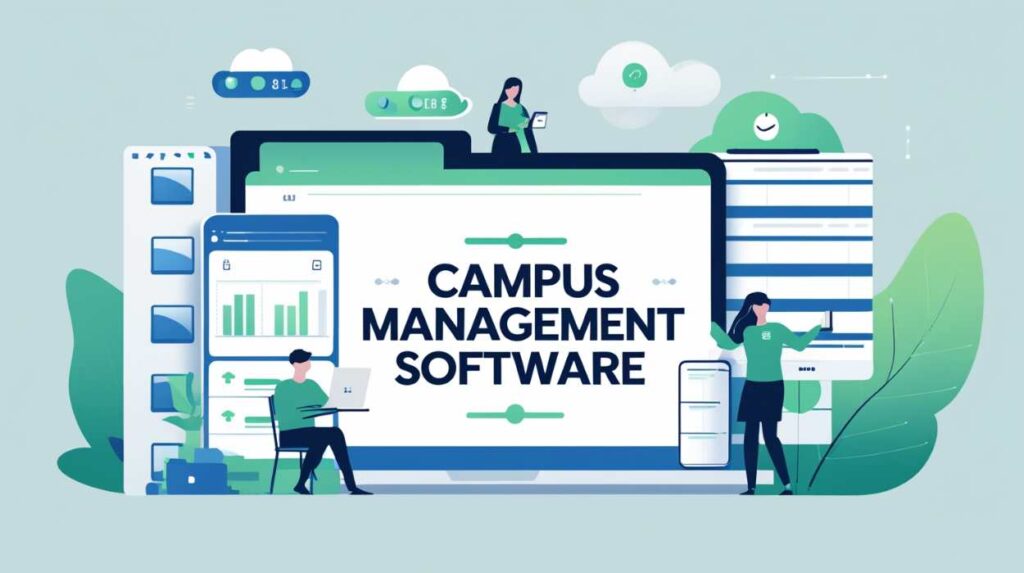The Indian education scenario is evolving rapidly and entering a digital world where nothing stands apart. Our schools and colleges have long been saddled with outmoded, manual methods of doing things. This has created all kinds of administrative nightmares and has made communication a difficult task among people.
However, today, automation is being pushed hard, and it is disrupting our education system in a significant manner. It is not a minor modification but a revolution! A large component of this change is the National Education Policy (NEP) 2020 which has brought about a new era of efficiency, transparency, and learning that is truly student-centred.
Campus Management Software (CMS) lies at the centre of this revolution. Consider it as the digital spine of the current educational establishments. CMS does pretty much all the work, including admissions, and maintaining contact with alumni. It makes complicated tasks easier and it provides a connected atmosphere among students, teachers and parents.
This guide will discuss the ways CMS is transforming things, the reasons it is getting so popular and required in India and will provide you with a glimpse of how to select the best CMS providers in this dynamic and constantly growing sector.
NEP 2020 and the Push for Smarter Campus Management
National Education Policy 2020 has been a game changer in the Indian education system, and it has provided a strong foundation of a future-ready learning ecosystem. One of the major thrusts of the NEP is the incorporation of technology in all levels of education. This has subsequently created an unmatched need of campus automation solutions. Here’s why:
- Focus on Digital Infrastructure: This is one of the key features of the NEP 2020, which specifically recommends the establishment of a strong digital infrastructure within the educational institutions. This encompasses all the way up to online assessment platforms and digital classrooms, which are all important parts of a complete CMS.
- Flexible and Multidisciplinary Education: The policy emphasis on providing students with flexible and multidisciplinary curriculum requires a system that is able to handle complex subjects combinations, credit transfers and individual learning plans. This complexity would make a manual system collapse.
- Data-Driven Governance: NEP 2020 promotes a more transparent and data-informed governance of the institutions. A CMS gives a centralized data store, which allows administrators to make informed decisions by using real-time analytics.
- Improved Learning: The NEP hopes to free up educational professionals by automating the administrative side of the profession, allowing educators to do the one thing they are best at: teaching. A CMS would help with this by making everything as simple as attendance and grading, as well as communicating with parents.
- Emphasis on Skill Development and Employability: The policy focuses on employment and skill development, which means that the institutions must monitor the progress of students in various fields. Skill based tests, internships and placement records can also be managed through a CMS.
What is Campus Management Software (CMS)?
Simply put, Campus Management Software (CMS) commonly known as Education ERP (Enterprise Resource Planning) system is a combination of software programs that automate and simplify the academic and administrative processes of an educational institution. Consider it as the central nervous system of a campus, that links different departments, processes and stakeholders of a campus such as students, teachers, parents, and administrators, on one common and unified platform.
A CMS would be involved in every part of the academic experience of a student, starting with the day he or she makes an inquiry on how to apply to school to the day he or she graduates and becomes an alumnus. It automates and streamlines the previously time-consuming and human error-prone processes, including admissions, collection of fees, formation of timetables, management of exams and management of libraries.
Key Features of a Good Campus Management Software
Although the details can be different, the following modules should be considered as the essential part of a complete and successful Campus Management Software:
- Student Information System (SIS): This is the heart of any CMS and deals with the whole student lifecycle, starting with admission and going through graduation, including personal information, academic history and so on.
- Admission Management: Automates the whole process of admission including online application, verification of documents, payment of fees and enrollment.
- Fee Management: Automates the fee collection process, produces receipts, reminds outstanding payments and produces detailed financial reports.
- Attendance Management: Allows teachers to manage attendance electronically, automatically notifies parents when a student is absent and provides attendance reports.
- Examination and Gradebook Management: Helps build examination timetables, input marks and automatic production of report cards and transcripts.
- Timetable Management: Assists in the development and maintenance of complicated timetables based on the availability of teachers, classrooms and other resources.
- Library Management: Automates the running of the library such as cataloging of books, issuance and returns and overdue books.
- Human Resource Management: Handles the information of employees, payslips, leave applications, and performance evaluation.
- Hostel and Transport Management: Makes the management of hostel accommodation and transportation services of students easier.
- Parent/Student Portal: Enables the parents and students to have a specific portal on the internet to view information, communicate with the teachers and monitor academic progress.
- Mobile App: An easily accessible mobile application, which will allow accessing the main features even when a person is on the road.
- Reporting and Analytics: Creates various reports and uses data to offer information that can support decision-making.
Top 10 Campus Management Software Providers in India
Here is a curated list of 10 of the top Campus Management Software providers in India:
1. Teachmint
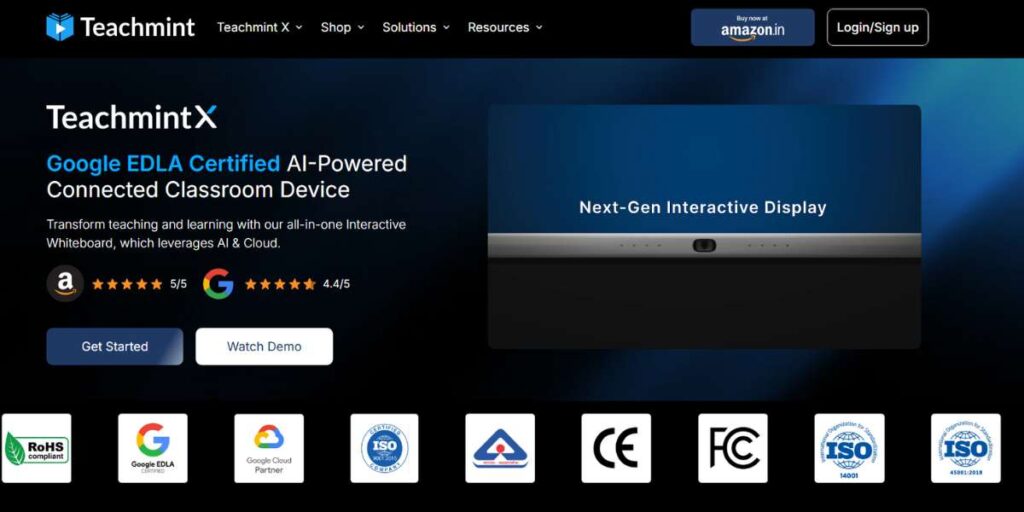
- Target Audience: K-12 schools, colleges, universities and coaching centers.
Teachmint is one of the most popular ed-tech companies that have quickly become the most recognizable solution to educational organizations. It began as an online teaching platform and has developed into a full campus management platform. Teachmint also provides an integrated product that brings together a Learning Management System (LMS) and a powerful ERP. It is meant to digitalize all the processes of an institution including administrative, academic delivery among others. The platform has a reputation of an easy-to-use interface and emphasizes the development of a connected learning environment among students, teachers, parents, and administrators. The mobile-first approach used by Teachmint means that all stakeholders can access the information and do their work wherever and whenever.
Key Features:
- Integrated LMS and ERP
- Live classes with recording
- Automated attendance
- Fee management with online payment gateway
- Examination and report card generation
- Digital content sharing
- Mobile app for all stakeholders
- Pricing: On request.
- Website: https://www.teachmint.com/
2. Fedena
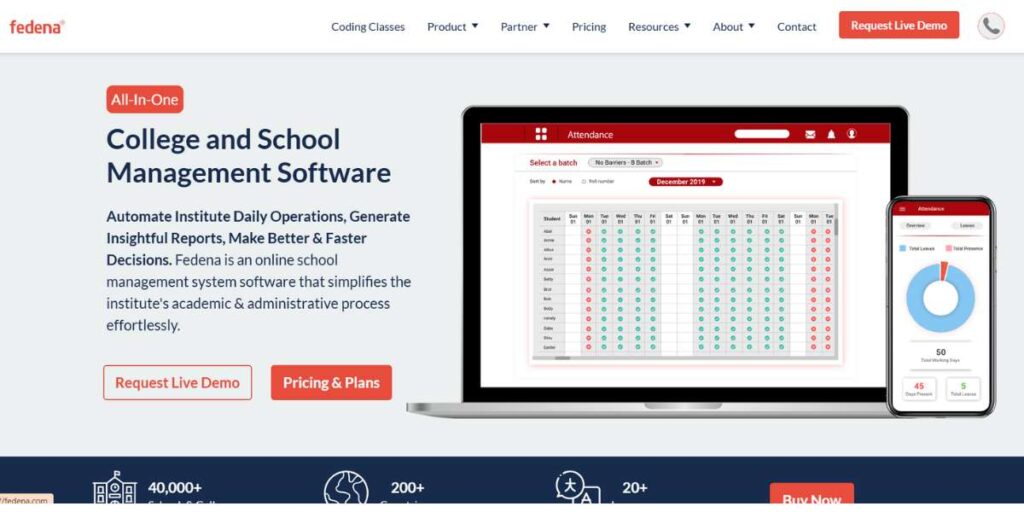
- Target Audience: K-12 schools, colleges, and universities.
Fedena is a very well-settled and popular campus management software in India and the world. It is an open-source ERP system which provides a high level of customization. Fedena offers a wide set of modules to handle every academic and administrative activity. It is open source and therefore institutions can modify and extend its functionality to suit their unique requirements. Fedena has been touted to be feature-rich, scalable and has an active developer community that improves it continually. It is a flexible platform that can be deployed both on-premise and as cloud-based platforms.
Key Features:
- Student admission and lifecycle management
- Timetable management
- Examination and gradebook
- Human resource management
- Finance and fee management
- Library and transport management
- Customizable reports
- Pricing: On request.
- Website: https://fedena.com/
3. Entab CampusCare
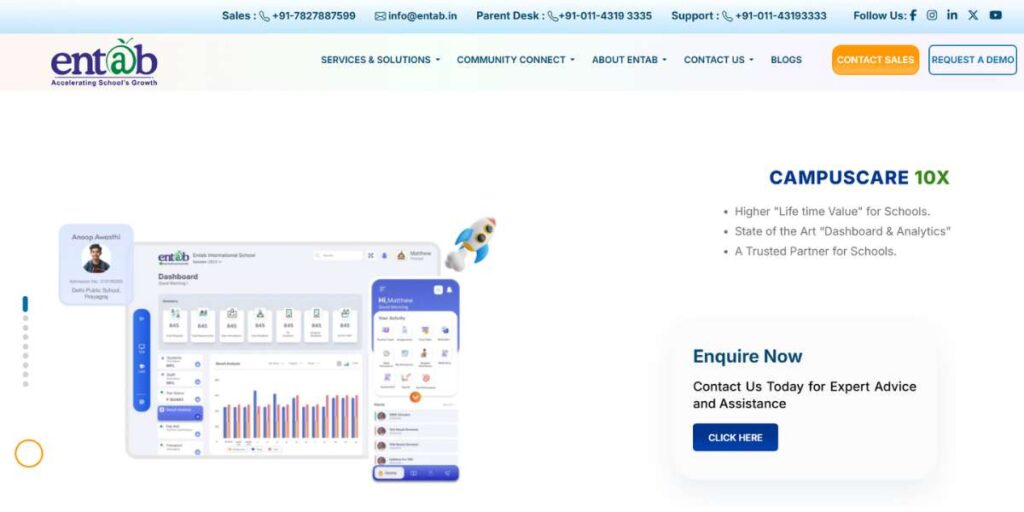
- Target Audience: Primarily focused on K-12 schools, especially CBSE and ICSE affiliated institutions.
Entab is the pioneer in the field of school management software in India with a history of more than 20 years. CampusCare, their flagship product is a household name in thousands of schools nationwide. CampusCare is a complete and mature ERP system which addresses the requirements of Indian schools. It provides a diverse set of modules which address all the areas of school management. Entab has reputation of being well versed with the Indian education system and adhering to the guidelines of different educational boards. The software will be easy to use by all the stakeholders even those with less technical knowledge.
Key Features:
- NEP 2020 compliant modules
- Admission and fee management
- Academic and examination management
- GPS tracking for school transport
- Mobile app for parents and teachers
- HR and payroll management
- Inventory and library management
- Pricing: On request.
- Website: https://www.entab.in/
4. Serosoft Academia ERP
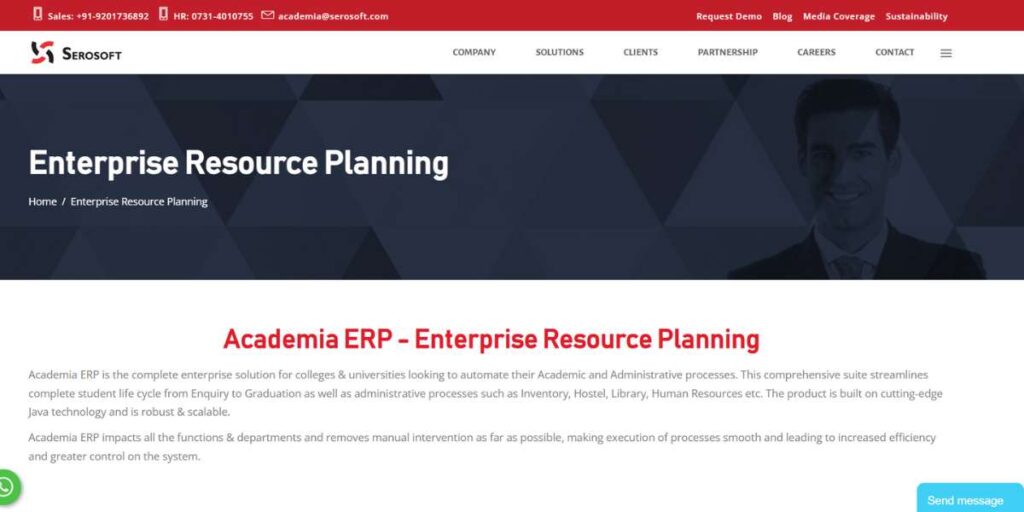
- Target Audience: Higher education institutions, including universities, colleges, and training centers.
Serosoft is an international ed-tech organization offering a high-end and award-winning ERP product, Academia, to learning institutions. Academia ERP is a very scalable and configurable product that addresses the complex requirements of higher education. It automates the student life cycle including admissions to alumni. Serosoft has a reputation of being innovative, using such technologies as AI and analytics to offer practical insights to institutions. It is considered to be the best campus management software. Academia ERP enables institutions to increase their operational efficiency, student engagement and their strategic objectives.
Key Features:
- Student lifecycle management
- Accreditation and compliance management (NAAC, NBA)
- Outcome-Based Education (OBE) module
- Faculty and placement management
- Finance and HR management
- Multi-campus support
- Advanced analytics and dashboards
- Pricing: On request.
- Website: https://www.serosoft.com/
5. MasterSoft ERP Solutions
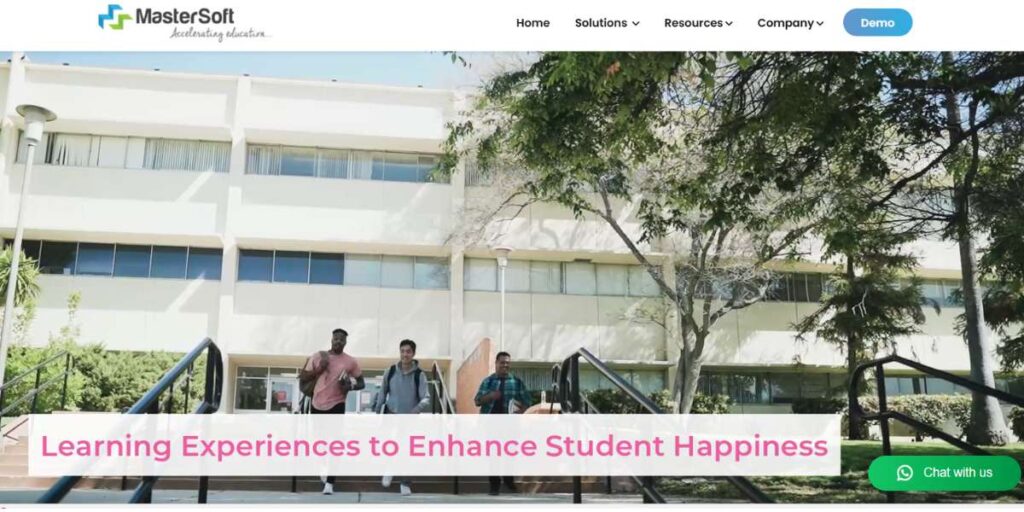
- Target Audience: Universities, colleges, and schools.
MasterSoft is one of the most popular education ERP solution providers in India that has been in the market since more than twenty years. MasterSoft provides a complete and integrated ERP system that encompasses a large number of academic and administrative processes. The firm is characterized by its strong technology base and its capability to support the various requirements of various forms of educational institutions. You will find a choice based credit system. Along with accredited data management such as NAAC, NBA. The ERP developed by MasterSoft is user friendly and it can be tailored to suit the needs of a particular institution.
Key Features:
- Accreditation Data Management (NAAC, NBA)
- Choice Based Credit System (CBCS)
- Online admission and fee payment
- Examination and result management
- Library and hostel management
- Biometric attendance
- Mobile application
- Pricing: On request.
- Website: https://www.mastersofterp.com/
6. Creatrix Campus
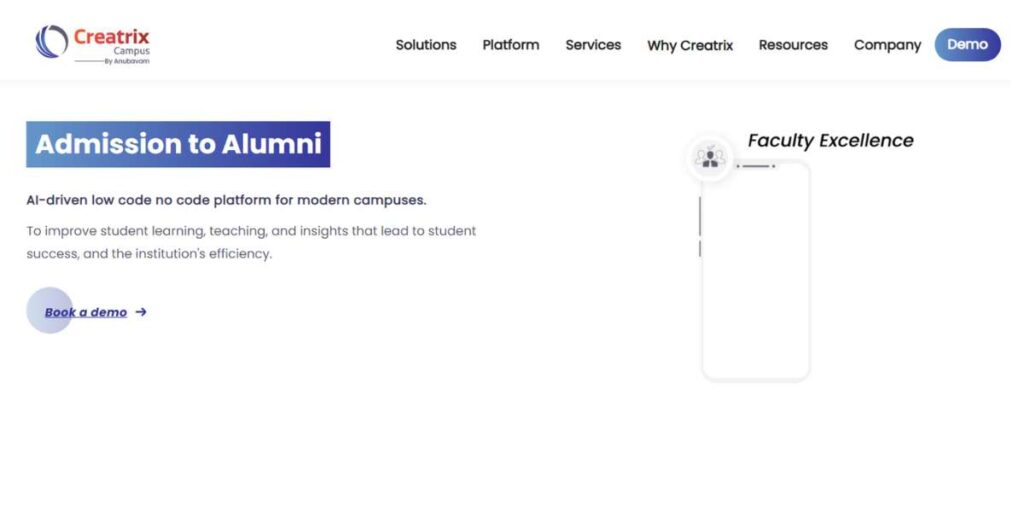
- Target Audience: Higher education institutions.
Creatrix Campus is a new age and futuristic cloud-based campus management software company that is aimed at providing a smooth and interactive experience to all the stakeholders. Creatrix Campus provides a complete set of solutions that take advantage of the most recent technologies such as AI, cloud computing, and mobile technology. The platform is very customizable and can be configured to the specific workflow of any institution. Creatrix Campus focuses on enhancing student performance and institutional performance by its data-driven nature and user-focused design.
Key Features:
- Outcome-Based Education (OBE)
- Accreditation management
- Student lifecycle management
- Learning Management System (LMS)
- Faculty management
- AI-powered analytics
- Mobile-first design
- Pricing: On request.
- Website: https://www.creatrixcampus.com/
7. MyClassCampus
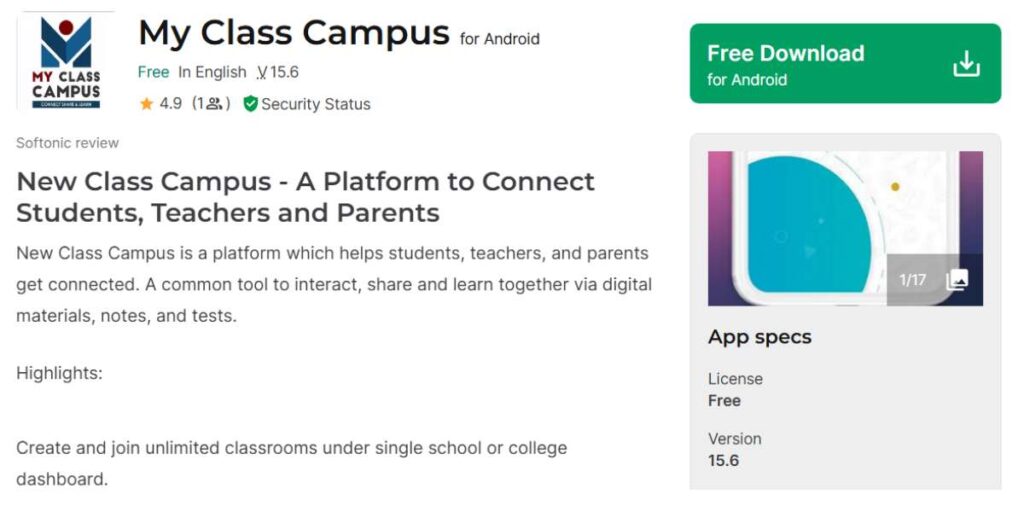
- Target Audience: Schools, colleges, and coaching classes.
MyClassCampus is a well-known ERP system that began its existence with the idea to enhance communication and has evolved into a full-fledged management platform. MyClassCampus is a mobile first platform that assists educational institutions to digitalize their processes and improve communication. It provides a broad scope of modules to handle all the functions such as admissions and finances. The platform has an intuitive mobile application that ensures a smooth experience among students, parents, and teachers. MyClassCampus is meant to build an intelligent and networked campus ecosystem.
Key Features:
- Mobile app for all stakeholders
- Fee management with payment gateway
- Lesson planning and homework management
- GPS tracking for school buses
- Communication module with chat and announcements
- Biometric and RFID attendance
- Inventory management
- Pricing: On request.
- Website: https://www.myclasscampus.com/
8. Vidyalaya School Software
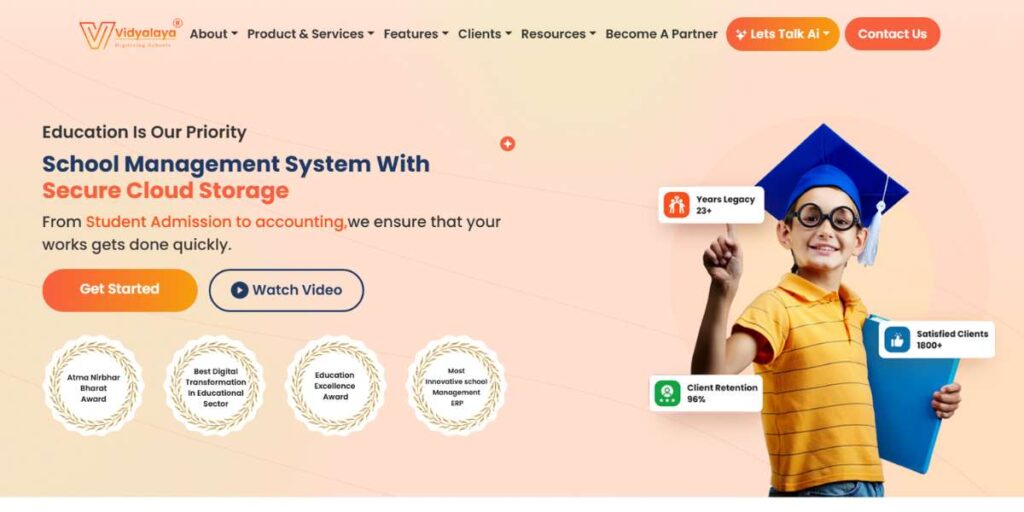
- Target Audience: Primarily K-12 schools, but also suitable for colleges and coaching centers.
Vidyalaya is an all-in-one and easy to use school management software that has been in the service of the education sector over decades. Vidyalaya has a single solution ERP system that is easy to use but robust in features. It has all the necessary modules needed to have a smooth running of a school. Vidyalaya has been providing outstanding customer support and has made it its mission to offer a stable and low cost solution to educational institutions. The software is both online and offline.
Key Features:
- Online and offline versions
- Student admission and information system
- Fee and financial accounting
- Examination and report card generation
- Library and inventory management
- Vehicle tracking system
- Mobile app for parents and students
- Pricing: On request.
- Website: https://www.vidyalayaschoolsoftware.com/
9. Ireava
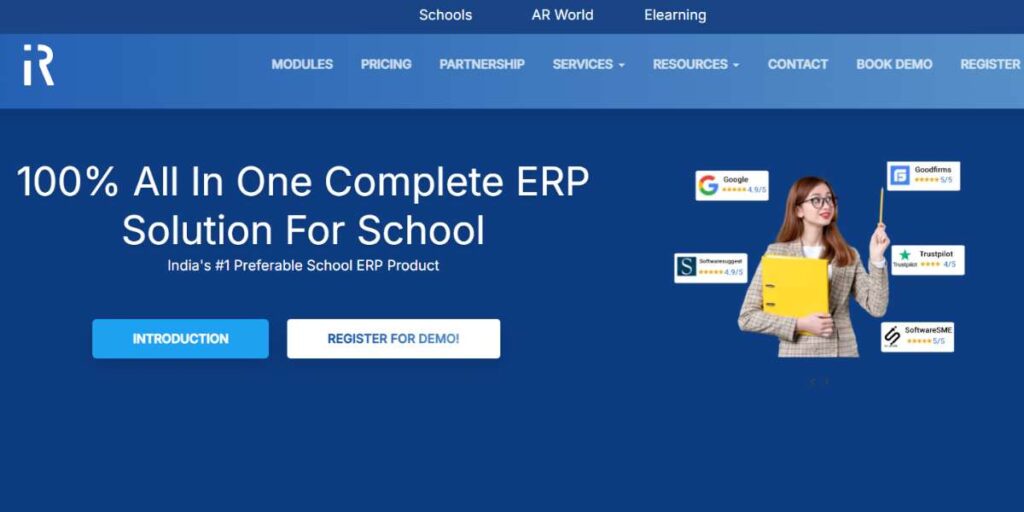
- Target Audience: K-12 schools.
Ireava is a feature-packed and up-to-date school ERP software that is designed to offer a comprehensive digital solution to the educational institutes at an inexpensive rate. Ireava is simple to implement and simple to use cloud-based ERP. It offers a large number of modules to automate every school process. Ireava has a reputation of being transparent in its pricing and its attention to a smooth user experience. The platform continuously receives new features and functionalities in order to address the changing needs of schools.
Key Features:
- Student and staff management
- Online fee collection
- Exam and timetable management
- Homework and lesson planning
- Mobile app for parents and teachers
- Transport and hostel management
- Inventory management
- Pricing: Offers various plans with transparent pricing on their website.
- Website: https://www.ireava.com/
10. Tata ClassEdge
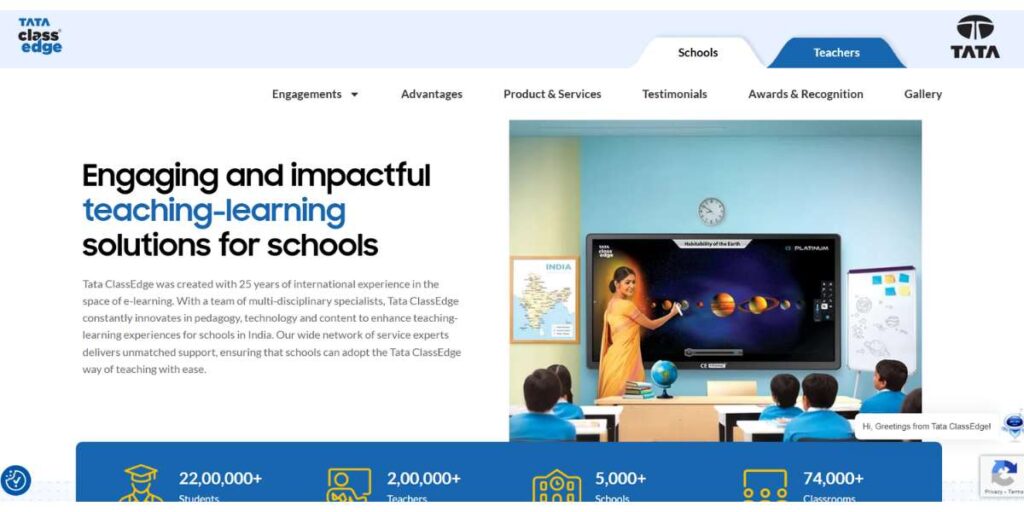
- Target Audience: K-12 schools.
Tata ClassEdge, a Tata Group company, is a household name as far as education technology is concerned in India. Although it is mostly recognized as a digital classroom provider, it has campus management features as well. Tata ClassEdge is a comprehensive learning solution which integrates interactive classroom content with a school management system. It will help to make the learning more interesting and efficient through the use of technology. The platform assists schools in managing their academic and administrative work as well as offering teachers with rich digital resources to support their teaching.
Key Features:
- Interactive classroom content
- Lesson planning and delivery tools
- Assessment and performance tracking
- Student and teacher management
- Communication portal
- Focus on pedagogical innovation
- Pricing: On request.
- Website: https://www.tataclassedge.com/
How to Choose the Right CMS for Your Institution
The Campus Management Software selection is a strategic decision and it can affect your institution in the long run. The following are the steps to take in order to make the right decision:
- Establish a Committee: Establish a cross-functional committee that has representation of all departments such as administration, finance, academics and IT. This will guarantee that the interest of all stakeholders is taken into consideration.
- Clarify Your Needs: List clearly your present needs and future needs of your institution. Choose features and modules that are of the utmost importance to you.
- Establish a Budget: Establish a realistic budget of the software, the initial cost of implementation and recurrent cost of maintenance or subscription.
- Research and Shortlist Vendors: Start with the list above and do a detailed research on the possible vendors. Narrow down to 3-5 vendors that match your needs and finances.
- Request Demos: Request in-depth demonstrations with the vendors that are shortlisted. Write a list of questions and situations to check the possibilities of the software.
- Check References: Request other institutions using the software to give references. Obtain their comments on the product, the implementation process and the support of the vendor.
- Test Technical Factors: Test the technology stack, security, scalability and integration of the software.
- Think About User-Friendliness: The software must be friendly, and should be easy to use by all users including non tech-savvy users.
- Evaluate Post-Sales Support: Inquire about training and support services of the vendor. An excellent vendor will offer extensive training and support.
- Negotiate the Contract: After you have decided, you should carefully read and negotiate the contract, and pay special attention to terms and conditions, service level agreements (SLAs) and future upgrade policies.
Challenges in CMS Adoption
Although the advantages of a CMS are indisputable, the road to its successful implementation may be fraught with difficulties. Knowing about these possible obstacles can assist you to overcome them in advance:
- Resistance to Change: Those staff and faculty that have been used to doing things manually may be resistant to new system.
- Data Migration: The process of transferring data in the legacy systems to a new CMS may be a complicated and lengthy process.
- Insufficient Training: Insufficient training may result in poor utilization of the software and frustration to the users.
- Cost overruns: The cost of ownership (customization, training and maintenance) may sometimes go beyond the budget.
- Compatibility with Other Software: Compatibility of the new CMS with other current software programs may prove to be a technical challenge.
- Selecting the Wrong Vendor: Selecting a vendor that does not know your needs and who cannot provide sufficient support will result in a failed implementation.
- Absence of a Roadmap: A clear vision and a clearly laid out implementation plan are lacking, and the project might lose its way and impetus.
Conclusion
The use of Campus Management Software is no longer an issue of whether but when by the educational institutions in India. With the era of digital transformation following the NEP 2020, a powerful CMS is the key to developing an institution ready to embrace the future. A CMS allows educational institutions to concentrate on their most important mission: raising the new generation of leaders, thinkers, and innovators, by automating administrative work, ensuring smooth communication, and delivering data-based insights. The path towards digital transformation is not always smooth, but it can be achieved through proper planning, the selection of the appropriate technology partner, and teamwork. Indian educational institutions can open a new chapter of efficiency, transparency, and excellence.
FAQs
1. How much does a Campus Management Software cost in India?
Depending on the size of the institution, modules needed and the vendor, the cost of a CMS may be very different. It may vary between a couple of lakhs to a couple of crores. Subscription based pricing is available with many vendors and may be cheaper with smaller institutions.
2. What is the implementation time of a Campus Management Software?
Depending on the complexity of the software, size of the institution and the preparedness of the institution data and infrastructure, time of implementation can vary between a few weeks to months.
3. Should I opt to use a cloud-based or an on-premise CMS?
The popularity of cloud-based CMS is growing because it is less expensive to implement, it is scalable, and it is more accessible. Nevertheless, not all large organizations might want to use on-premise solutions to have more control over their data and infrastructure.
4. Is it possible to customize a Campus Management Software?
The majority of the major CMS providers provide a very high level of customization to fit the demands of an institution. When evaluating the vendor, you should talk about your customization needs.
